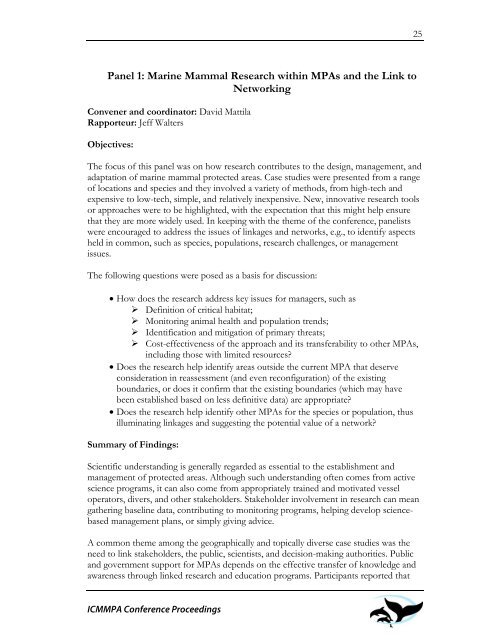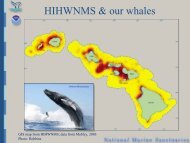The First International Conference on Marine Mammal Protected Areas
The First International Conference on Marine Mammal Protected Areas
The First International Conference on Marine Mammal Protected Areas
Create successful ePaper yourself
Turn your PDF publications into a flip-book with our unique Google optimized e-Paper software.
Panel 1: <strong>Marine</strong> <strong>Mammal</strong> Research within MPAs and the Link to<br />
Networking<br />
C<strong>on</strong>vener and coordinator: David Mattila<br />
Rapporteur: Jeff Walters<br />
Objectives:<br />
<str<strong>on</strong>g>The</str<strong>on</strong>g> focus of this panel was <strong>on</strong> how research c<strong>on</strong>tributes to the design, management, and<br />
adaptati<strong>on</strong> of marine mammal protected areas. Case studies were presented from a range<br />
of locati<strong>on</strong>s and species and they involved a variety of methods, from high-tech and<br />
expensive to low-tech, simple, and relatively inexpensive. New, innovative research tools<br />
or approaches were to be highlighted, with the expectati<strong>on</strong> that this might help ensure<br />
that they are more widely used. In keeping with the theme of the c<strong>on</strong>ference, panelists<br />
were encouraged to address the issues of linkages and networks, e.g., to identify aspects<br />
held in comm<strong>on</strong>, such as species, populati<strong>on</strong>s, research challenges, or management<br />
issues.<br />
<str<strong>on</strong>g>The</str<strong>on</strong>g> following questi<strong>on</strong>s were posed as a basis for discussi<strong>on</strong>:<br />
• How does the research address key issues for managers, such as<br />
� Definiti<strong>on</strong> of critical habitat;<br />
� M<strong>on</strong>itoring animal health and populati<strong>on</strong> trends;<br />
� Identificati<strong>on</strong> and mitigati<strong>on</strong> of primary threats;<br />
� Cost-effectiveness of the approach and its transferability to other MPAs,<br />
including those with limited resources?<br />
• Does the research help identify areas outside the current MPA that deserve<br />
c<strong>on</strong>siderati<strong>on</strong> in reassessment (and even rec<strong>on</strong>figurati<strong>on</strong>) of the existing<br />
boundaries, or does it c<strong>on</strong>firm that the existing boundaries (which may have<br />
been established based <strong>on</strong> less definitive data) are appropriate?<br />
• Does the research help identify other MPAs for the species or populati<strong>on</strong>, thus<br />
illuminating linkages and suggesting the potential value of a network?<br />
Summary of Findings:<br />
Scientific understanding is generally regarded as essential to the establishment and<br />
management of protected areas. Although such understanding often comes from active<br />
science programs, it can also come from appropriately trained and motivated vessel<br />
operators, divers, and other stakeholders. Stakeholder involvement in research can mean<br />
gathering baseline data, c<strong>on</strong>tributing to m<strong>on</strong>itoring programs, helping develop sciencebased<br />
management plans, or simply giving advice.<br />
A comm<strong>on</strong> theme am<strong>on</strong>g the geographically and topically diverse case studies was the<br />
need to link stakeholders, the public, scientists, and decisi<strong>on</strong>-making authorities. Public<br />
and government support for MPAs depends <strong>on</strong> the effective transfer of knowledge and<br />
awareness through linked research and educati<strong>on</strong> programs. Participants reported that<br />
ICMMPA <str<strong>on</strong>g>C<strong>on</strong>ference</str<strong>on</strong>g> Proceedings<br />
25



